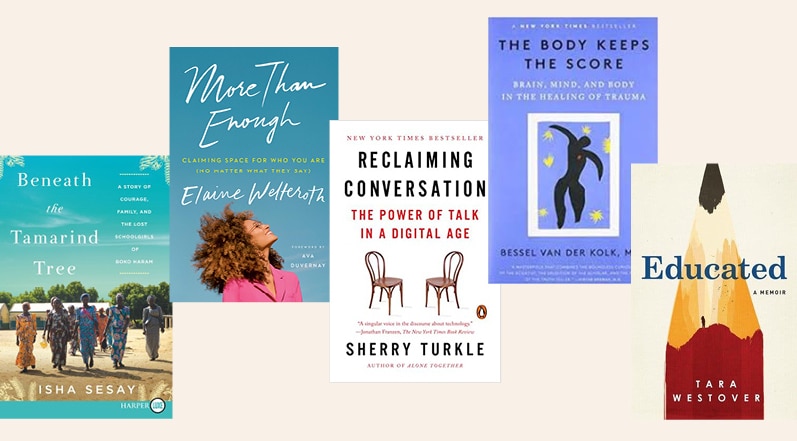Norma Buster, our Client Relations Manager, shares what made these tomes her top 5 lockdown reads (besides Nobody’s Victim, duh)
Beneath the Tamarind Tree, Isha Sesay
International Journalist Isha Seshay details Boko Haram’s 2014 abduction of 276 schoolgirls from Chibok, Nigeria. It’s the first definitive account of the kidnapping, and Seshay tells stories of some of the girls who made it home, while bringing awareness to the fact that many of the young women are still in captivity today. Seshay’s telling of this story reminds us how important it is to elevate the voices of those who are silenced. She describes the attempt by corrupt politicians and media to quiet and downplay the story, yet she was determined to bring it to light. She also discusses the role that advocacy played in bringing global attention, through social media campaigns like #BringBackOurGirls. As victims, we may find our voices silenced, but Seshay reminds us why that makes it even more important to share our stories.
Educated, Tara Westover
Tara Westover’s memoir is all about her journey to overcoming her old values and taking life into her own hands. She grew up in a survivalist family in the mountains of Idaho but under her own steam she educated herself and wound up studying at Harvard and Cambridge. Tara’s story is unique—she was incredibly isolated from society, but still I found myself discovering more in common with Tara than I thought. I’m a survivor (like many of you reading this) and after facing adversity, I had to rid myself of the shame inflicted on me in order to move forward.
Because I was the victim of a sexual crime as a woman, I was slut-shamed (as is typical) by all sorts of folks – from family members, to law enforcement, to society-at-large. If Tara had listened to those around her, she wouldn’t have questioned whether to leave her community. If I had listened, I would’ve been silenced by shame.
The Body Keeps the Score, Bessel van der Kolk, M.D.
This is all about how trauma affects the body. I was diagnosed with PTSD a few years after my experience, but my symptoms had been building up before I even realized. I’ll be honest — I had to put the book down a few times, because what van der Kolk described was a little too real, but it helped me realize the many ways my experience had affected me. And coming to those realizations has been crucial to helping me heal.
Trauma literally rewires the brain and body and tampers with the mind-body connection. For example, if we’re always in “survival mode,” as trauma survivors often are, it can lead us to ignore our own gut feelings in an attempt to gain some control. We make ourselves numb to what our body tells us. And that’s why for so many trauma survivors, even physical ailments can go unnoticed, because the survivor can no longer detect danger or harm within the body.
Thankfully, there are things we can do to help re-link physical sensations with emotions. I’ve always loved lifting weights, because there’s nothing like that mind—muscle connection when you target certain parts of your body. During lockdown, I’ve been making it a point to get at least 20 minutes of yoga in the morning which has been a really grounding activity to start the day.
Reclaiming Conversation: The Power of Talk in a Digital Age, Sherry Turkle
Turkle published this in 2015, but reading it in lockdown, I found it more relevant than ever. She discusses the ways technology can weaken relationships, productivity, and creativity, while emphasizing that things can always get better with face-to-face communication. It helped me to consider the ways in which connection has been so incredibly healing during these hard times. We’ve had to get creative to make connecting a little more intentional, whether that’s digitally or in person. For me, that means trivia and karaoke nights with coworkers over video chat, and ordering board games to play with housemates and making it a point to eat our meals together every day.
I’ve seen a lot of tweets saying that the quarantine has shown that not every conversation has to be a meeting, email often suffices. But for me, lockdown proves that nothing can replace that connection you get when you’re in a room with someone and engaged in a conversation with them.
More Than Enough: Claiming Space For Who You Are (No Matter What They Say), Elaine Welteroth
Elaine Welteroth is credited for making social justice a priority at Teen Vogue as their former Editor in Chief. She was the youngest person and second African American in history to hold the title at Conde Nast. I loved More Than Enough, because Elaine is candid about obstacles she faced, and she shows her determination in her ability to get sh*t done. She had to forge her own path, or else she wouldn’t accomplish what was important to her or spread the messages she knew needed to be ‘out there’, and she made it a point to elevate marginalized voices as she reached success.
More Than Enough made me think of my own boss, Carrie, who became the lawyer she needed. It’s the spirit that keeps our firm growing and keeps our movement alive, as more and more victims become warriors!
Now check out:
- SOCIALLY DISTANCED DATING AS A DIGITAL ABUSE SURVIVOR
- A GUIDE TO COPING WITH QUARANTINE AS A SURVIVOR OF DIGITAL VIOLENCE
- TOP 5 MYTHS ABOUT ONLINE ABUSE
Our attorneys and staff have never been more devoted to helping clients. We are fully staffed (working remotely) please contact us or call 646.666.8908 to schedule a case evaluation.
Let’s stay connected!




